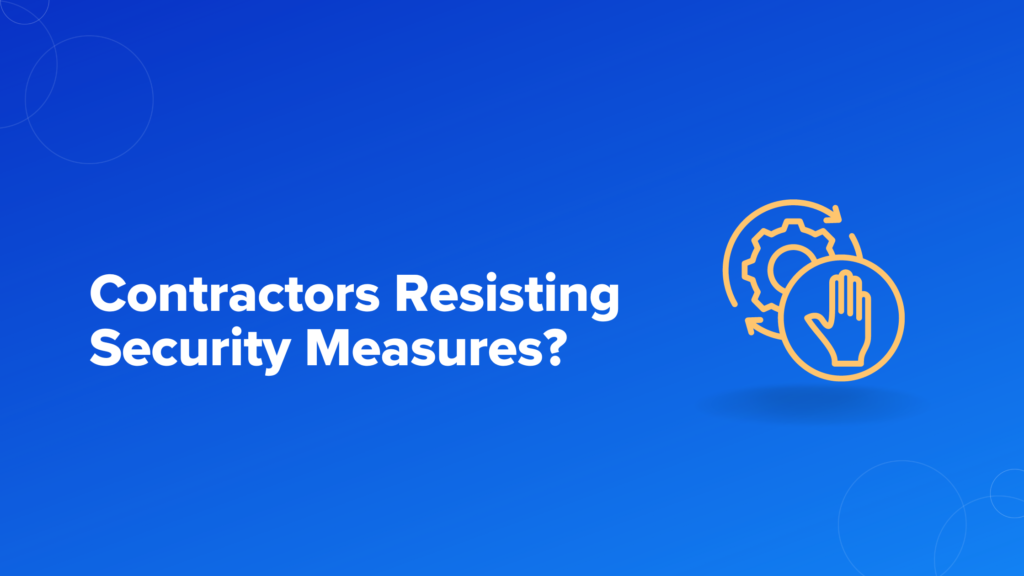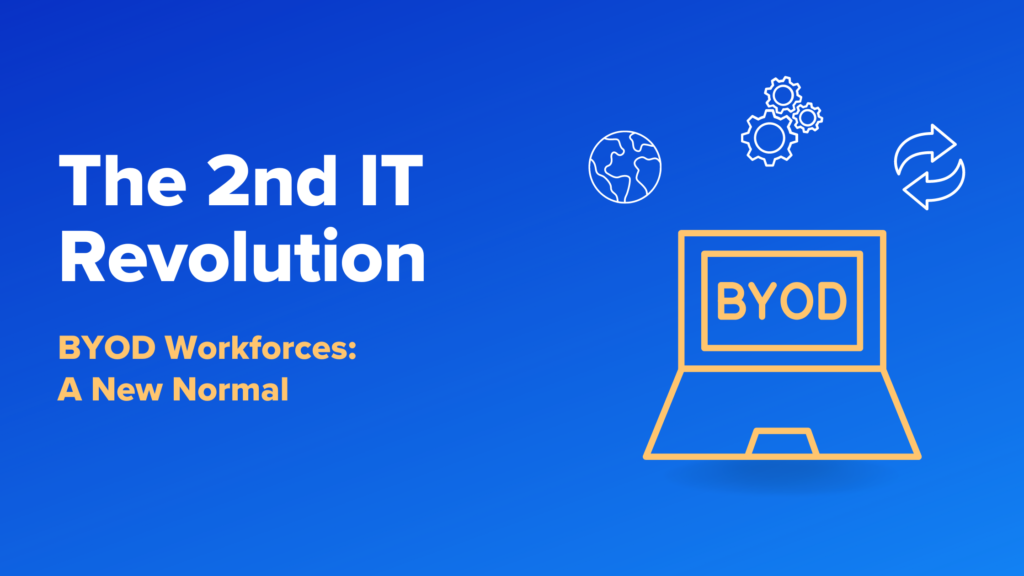Overcoming Contractor Pushback to Installing BYOD Security Measures

We’ve all noticed the uptick in remote work and the growing trend for companies to employ contractors who provide specialized skills on a freelance basis. Apparently, this new ‘gig economy’ is here to stay. According to a study by Upwork and Freelancers Union, in 2023, 38% of the U.S. workforce, or 64 million Americans, performed freelance work. Some pundits forecast that freelancers could constitute a majority of the U.S. workforce within a decade.
We’ve undergone a fundamental shift in how people work, where the focus is on working when and where you want. Flexibility and autonomy are high priority for freelancers, and they generally prefer using their own devices to streamline their work processes and maintain control over their work environment. As a result, more companies are adopting Bring Your Own Device (BYOD) policies to efficiently integrate this growing segment.
The Bring Your Own Device (BYOD) trend is raising new data security challenges for companies hiring contractors. When contractors use their personal devices for work, it increases the risk of data breaches, because these devices generally don’t have the same level of security as company-provided hardware. These personal devices are more vulnerable to malware and unauthorized access, leaving sensitive company data at risk of being compromised—and the company itself at risk of not staying compliant with standards and regulations for personal data. What’s more, contractors may use unsecured networks, further exposing company information to potential cyber threats.
To mitigate these risks, companies need to enforce strict BYOD policies, ensure that contractors’ devices comply with security standards and compliance regulations, and provide secure access methods such as software to ensure security, VPNs, Secure Enclaves, and multi-factor authentication.
This blog unpacks some of the reasons contractors are hesitant to install security measures on their personal devices and provides several strategies to help you overcome the pushback while safeguarding BYOD security for your company.
Why contractors are reluctant to install security software on their devices
But what contractor wants to install all kinds of external company software on their personal device? Here are some of their concerns:
- Data privacy and integrity: Contractors are concerned that security software will be invasive, monitoring personal activities and collecting data that is not relevant to work tasks. They want to know that there is a clear separation between personal and professional data, that their privacy will be respected, and that the software will only focus on work-related activities.
- Previous negative experiences with similar software: Most people, including contractors, have experienced the slowdowns, technical glitches in performance, or conflicts caused by security software like VPNs or VDIs. Contractors need reassurance that any security software installed is not going to cause frustration and setbacks when it comes to productivity.
- Compatibility issues and conflicts with existing systems: Contractors may be justified in worrying that new software will interfere with their current applications and workflows. Compatibility issues can lead to software crashes, loss of functionality, or system instability–all of which can impact whether you do or don’t make that deadline.
- Complexities in the user experience: Any added software can complicate life for contractors by introducing new, non-intuitive steps into their workflows. Managing the software, running updates and troubleshooting issues–with or without IT support–can seriously disrupt their work. Contractors count on having workflows that are as streamlined and efficient as possible.
- Malware or security breaches: Contractors don’t want to risk installing security that may introduce vulnerabilities, leaving their devices more susceptible to cyberattacks or malware. It’s not unheard of for security software to be compromised or targeted by cybercriminals and the contractors are justified in wanting to minimize exposure.
The risks of insecure BYOD/BYO-PC
But, not having the contractors install software to protect their devices from cyberattacks, like data theft or malware, can have severe repercussions for the business. Any company hiring outside contractors should be wary of the following:
- Increased security risks: Until the software is installed, or if it is not installed, the company is going to be vulnerable to potential security breaches. Most contractors’ personal devices are missing protection against issues like malware, phishing attacks, and unauthorized access–all of which put sensitive company data at risk. This can lead to data breaches, financial loss, and damage to the company’s reputation. Making sure that all devices connected to the network or working with company data meet security standards is crucial to protecting company assets.
- Delays in project timelines: Long negotiations with contractors about how and when they’ll install the security software can delay the start of projects. The results may be pushed off deadlines, deliverables that are not on schedule, and bottlenecks that disrupt the business operations. Keeping productivity optimized is essential for any business.
- Strained relationships and frustration: Things can get unpleasant when contractors feel they’re being railroaded into installing software they don’t want and companies feel they can’t risk lack of compliance with security standards. Everyone loses out when relationships are strained, morale and motivation go down, and productivity suffers. These concerns need to be addressed so there is a mutual understanding and a solution that keeps everyone at ease.
Strategies to overcome pushback
The best way to overcome contractor pushback is by using a multifaceted approach that addresses contractor concerns while ensuring a more secure environment.
Education and training: Offering contractors detailed information on why they need the security software and how it can protect both the company’s data and their privacy will help build trust. By conducting training sessions, you can explain how the software works, how it prevents data breaches, and how it helps maintain compliance regulations. Giving real-world examples and statistics of what can go wrong without proper security will also help get their ‘buy in’ for adoption.
Involving contractors in the decision-making process: When contractors feel their opinions are valued and considered, they are more likely to agree to the implementation of security measures. This involvement can be in the form of feedback sessions, surveys, or focus groups where contractors can express their concerns and preferences. A collaborative approach will create a sense of accountability among contractors, making them more willing to comply with security protocols.
Providing reassurance through case studies and testimonials: Sharing real-life examples in which the security software protected data without disrupting contractor workflows can help address their fears and highlight the practical benefits. Testimonials from peers who had a positive experience can be especially persuasive because they’ll be seen as a credible source of information.
Simplifying the installation process with guides and support: Making the installation process as straightforward as possible is critical to reducing pushback. Also, providing step-by-step guides and responsive technical support will help your contractors install the software with minimal hassle. The guides can include detailed instructions, video tutorials, and troubleshooting tips that address common issues. This kind of support will help contractors feel more confident and reduce their reluctance to adopt it.
Essential features for the ideal solution
The best BYOD security solution will seamlessly integrate into your contractors’ workflows while maintaining robust security standards. Look for solutions that offer the following features:
- Simple installation: The software should be easy to install and configure, minimizing disruption to the contractor’s workflow. A solution like Venn’s Secure Enclave is easily self-installed by the contractor on their PC or Mac–eliminating the need for companies to buy, ship, or lock down computers.
- Separation between work and personal: The security solution should create clear boundaries between work-related and personal data, respecting the contractor’s privacy. For example, with Venn, work applications run locally within a secure enclave–visually indicated by a Blue Border–that isolates and protects business activity from any personal use on the same computer. But it goes both ways. Personal information is separated and off bounds for the company.
- No disruption to user workflows: The software should integrate seamlessly with existing systems and workflows, avoiding any interference with the contractor’s productivity. Here too, Venn unlocks a new level of productivity by allowing users to work locally with none of the lags or compatibility issues introduced by VDI.
- No interference or access to personal applications and work: The solution should make it easy for contractors to seamlessly toggle back and forth between their work and personal digital lives on the same device. Venn drives home this benefit without exposing the organization to data loss and leakage or monitoring the contractor’s computing resources.
- Onboarding and offboarding in minutes: Any solution should allow quick and efficient remote onboarding and offboarding processes to reduce administrative overhead and ensure compliance. Because Venn requires zero back-end infrastructure, it’s easy to onboard remote workers in minutes. When an employee leaves or is terminated, Venn can remotely wipe the secure drive that contains all the company files and data.
- Compliance with all important security standards: Any security software must meet all the relevant security standards such as PCI, SOC, HIPAA, SEC, FINRA, and NAIC to provide robust protection and regulatory compliance. With Venn, organizations can achieve compliance, control and visibility, without causing sluggish performance.
The path forward – seamless and secure contractor integration
By understanding and addressing the concerns of contractors, you can gain their trust and overcome the initial pushback. But by implementing a BYOD security solution that eliminates these concerns, you can foster a more positive and productive long-term working relationship.
Venn is the first purpose-built patented technology for secure BYO-PC that ticks all the boxes when it comes to contractor concerns and company security needs. Similar to an MDM solution but for laptops – work lives in a company-controlled Secure Enclave installed on the user’s PC or Mac, where business activity is isolated and protected from any personal use on the same computer.
Venn acts as a virtual wrapper around work applications, functioning like a firewall to control what goes in or out of the secure enclave. It secures remote work on any unmanaged or BYOD computer with a radically simplified and less costly solution than virtual desktops. Because it provides full isolation and separation between work and personal applications, contractor concerns about privacy, monitoring, or interference are all alleviated and companies are assured of compliance with the highest standards. Over 700 organizations, including Fidelity, Guardian, and Voya, trust Venn to meet FINRA, SEC, NAIC, and SOC 2 standards.
Want to learn more? Visit us at venn.com.
More Blogs



